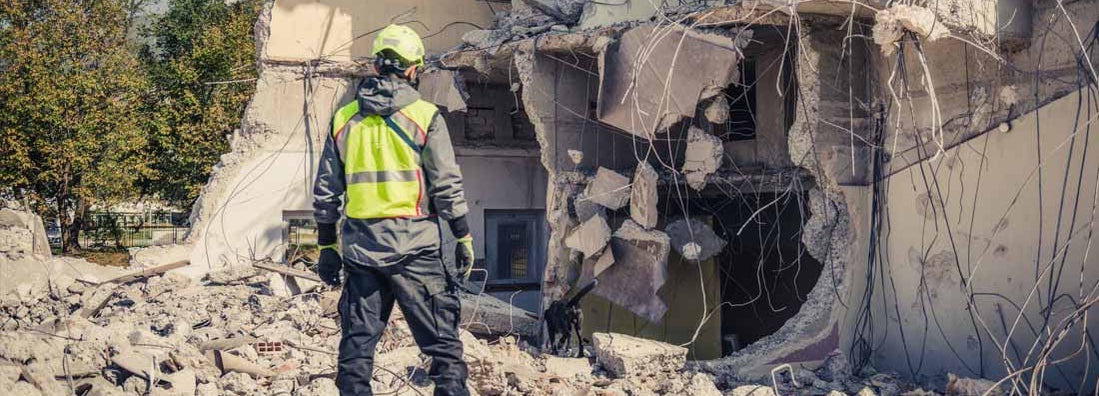Earthquake Safety Tips: How to Be Prepared in Case of an Earthquake

In 2020 alone, there were thousands of earthquakes across the world, causing varying levels of damage. While it’s difficult to predict when and where a quake can hit, there’s a lot you can do to prepare you and your loved ones for the next tremor.
Create a Household Evacuation Plan
With a household evacuation plan in place, you can help ensure that all members of your family know where to go during an earthquake and how to get there. It’s best to not only have a good plan but to practice it periodically, as well as update it if needed. Your evacuation plan should include:
- When to evacuate. Typically, the safest time is after the earthquake has stopped because many injuries happen while people are running around during a quake or aftershock.
- Where to go. If the earthquake is minor and doesn’t cause structural damage, it may be safest to use a spot inside the home for everyone to meet and decide what to do next. Otherwise, you should choose a location a significant distance from other buildings and structures that could collapse or catch fire.
- Which exits to use. The evacuation plan of a family in an apartment building will be different from that of one living in a house. Choose an escape route according to:
- Likely traffic conditions once you get outside
- Areas accessible by stair instead of an elevator
- Proximity to bedrooms, your living room, or another common area
Educate the Whole Family on What to Do
Everyone needs to be on the same page, particularly because some decisions that make sense during other disasters may be dangerous during an earthquake. For instance, when there’s a fire, you should always try to safely exit the building, but this isn’t the case with an earthquake, when you have to decide on a case-by-case basis.
What the Family Should Do during the Earthquake
During an earthquake, which may last only a matter of seconds, it’s important to protect yourself without increasing the risk of injury. While each situation is different, the following guidelines can keep you and your family safer:
- You should drop, cover yourself, and hold on to something
- Protect your head and torso
- Move as little as possible during the quake
- If you’re in bed, curl up and protect your head
- Stay inside until the shaking stops
- Use stairs instead of an elevator which can malfunction during a quake or aftershock
- If you smell propane or any other form of gas, get out of the house and move far away from it
- Check for debris that may fall from the building before leaving the house
What You Should Do after the Earthquake Stops
After an earthquake finishes, it’s best to assume that the disaster may continue in the form of:
- Aftershocks
- A tsunami if you’re near a coast
- Landslides
- Avalanches
- Fires caused by the earthquake
- Electrical hazards resulting from downed lines or other damage to power systems
- The threat of debris falling from damaged buildings
- Building collapse
- The collapse of other structures, such as bridges, ramps, or signs
With this in mind, it’s best to do the following after an earthquake hits:
- Only return home when authorities say it’s safe.
- Check yourself for injuries before helping others.
- Expect aftershocks, tsunamis, landslides, avalanches, and other natural events.
- For every aftershock, regardless of how strong it is, drop, cover, and hold on.
- Extinguish any small fires you see.
Make Sure Your Home Is Protected
Protecting your home from earthquakes involves two steps: ensuring the structure of the home and what’s inside are safe and getting earthquake insurance for your home or home-based business.
To keep your home as safe as possible during a quake, you can:
- Bolt your home to its foundation.
- Use flexible connections for your gas appliances.
- Ensure you have easy-to-access, functioning shut-off valves for all gas appliances.
- Keep your water heater securely in place.
- Use baby-proof latches to keep cabinets shut during a quake.
- Secure televisions to the wall behind them so they don’t fall forward during an earthquake.
To protect your home, business, or side hustle from the financial damage an earthquake can cause, you should choose the right kind of earthquake insurance. Reach out to your local trustedchoice.com agent to learn more about your insurance options. They’re there to support you, answer all of your questions, and ensure that you get coverage for your home in case of a natural disaster. If you don’t have one, you can find an independent insurance agent today.
